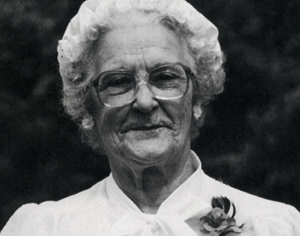
A young woman, as a result of a thorny beginning and negative suggestions made about her by her suitor, rejects him in favour of unknown possibilities.
Fleur D’Épine, 1996. Lucy Doucet. T-3257. Beaton Institute, Cape Breton University.
Artist
Lucy Doucet
Lucy Jane Doucet was born on March 1, 1909 in Belle Côte, Inverness County. She was the fourth of nine children born to Marcellin and Flavie Chiasson. Lucy attended school in Belle Côte until grade four. Her parents then suggested that she leave her studies to work at the lobster canning factory in Margaree Harbour. She worked as a manual labourer at the factory each spring for three years.
She later moved to Halifax, where she found work as a cook, parlour maid, butler, valet and kitchen maid in various family homes and at the Queens Hotel. On November 25, 1935, she married her husband Henry. Six years later, Lucy and Henry left Halifax for Belle Côte with their two children, Florence and Daniel, where they would spend the rest of their lives together.
Lucy had a lifelong passion for music. While attending the Belle Côte school, she learned many traditional French, English and Irish songs from a teacher. In her later years, Lucy remembered many of these songs and willingly shared them with individuals interested in preserving this part of Cape Breton’s music history. She passed away at the age of 96 on March 15, 2005.
These rare audio recordings of Lucy Doucet found on this website will help future generations understand and appreciate the rich history of Acadian music.
Lyrics
Fleur D’Épine
1. “La Nourric” qui m’a nourrie,
N’a jamais connu mon nom.
On me nomme, on me nomm’
Fleur d’épine, Rose blanche;
Fleur d’épine, c’est mon nom.
2. Fleur d’épine, Rose blanche,
C’est un nom bien cher vendu.
On me l’a, on me l’a,
On me l’a vendu sans doute
La valeur de cent écus.
3. Cent écus, c’est peu de chose.
Oui, puisque j’ai bien perdu,
J’ai perdu, j’ai perdu
L’amitié de ma maîtresse;
A présent je n’en ai plus.
4. Ce soir, à la promenade,
Mademoiselle, y viendrez-vous?
Oh! Non, non! Oh! Non, non.
Que le bon Dieu me préserve
D’être seule avec vous.
5. Mademoiselle, ne soyez pas si fière!
L’autre soir je vous ai vu’
Dans la pré, dans la pré,
Dans la pré du vert bocage,
Un amant auprès de vous.
6. Tous les garçons du village
Ils sont tous des jeunes gens.
Oui, ils sont. Oui, ils sont,
Ils sont plus beaux sous la lune
Que vous êtes en plein jour!